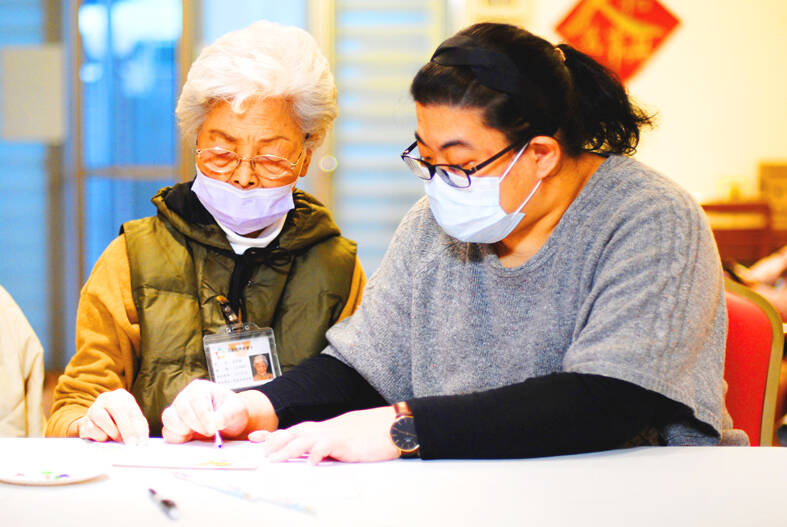The latest poll showed that 73 percent of families disliked a government plan to transfer senior citizens with moderate cognitive decline to daycare centers from community-based ones, the Taiwan Alzheimer’s Disease Association (TADA) said yesterday.
The most frequently cited reasons for the reluctance were concerns over their ability to provide the residents with the activities they wanted, long commutes and cost, said association chairman Hsu Wen-chuin (徐文俊).
The survey had 861 valid written responses across 21 counties and special municipalities, he said.

Photo courtesy of Taiwan Alzheimer’S Disease Association
The Ministry of Health and Welfare has previously proposed to remove senior citizens who score two or higher on the Clinical Dementia Rating scale or are deemed to have category four to category eight long-term needs from community-based solutions.
Although the intention is to send elderly with significant cognitive decline to centers qualified to help them, Hsu said 39 percent of families would rather forfeit their long-term care subsidies than send their loved ones away.
The ministry’s plans would increase economic hardship on families, as community-based centers cost NT$6,000 to NT$11,200 per month, which might be unaffordable for some who are already paying for a caregiver, he said.
The strain on the families would likely reduce the quality of life for elderly people and worsen their cognitive decline, Hsu said.
He urged the ministry to address issues such as insufficient resources and coordination between types of long-term care service providers and said that the government should relax the standards for families to use community-based solutions, increase care options and avoid making constant policy changes.
Department of Long-Term Care deputy director-general Wu Hsi-wen (吳希文) said the nation’s 500 community-based care centers cannot help 35,000 Taiwanese diagnosed with age-related cognitive decline.
People with moderate or severe cognitive decline are best cared for at certified daycare centers that are better equipped and trained than strained centers, she said.
Local governments have been advised to ensure that day centers provide necessary treatments to delay or prevent decline and that they do not refuse service to elderly people who can no longer care for themselves, Wu said.
The ministry is to provide additional funding to centers that have elderly residents with behavioral problems related to decreased ability to self-regulate, she added.

RESOLUTIONS DEBATE: Taiwan’s allies said that UN and WHA resolutions cited by China and other nations ‘do not determine Taiwan’s participation in WHO activities’ A proposal to invite Taiwan to this year’s World Health Assembly (WHA) was rejected on Monday, resulting in Taipei’s absence from the annual meeting for a ninth consecutive year, although partners spoke up for Taiwan’s participation at the first day of the meeting. The first agenda item after the opening was a “two-on-two debate” on a proposal to invite Taiwan to participate at the WHA as an observer. Similar to previous years, two countries made statements in favor of the proposal, while two others expressed their opposition. Philippine Secretary of Health Teodoro Herbosa, president of the 78th WHA, accepted the WHA General Committee’s

Palauan President Surangel Whipps Jr arrived in Taiwan last night to kick off his first visit to the country since beginning his second term earlier this year. After arriving at Taoyuan International Airport at around 6:30 pm, Whipps and his delegation were welcomed by Minister of Foreign Affairs Lin Chia-lung (林佳龍). Speaking to gathered media, the Palauan leader said he was excited and honored to be back in Taiwan on his first state visit to Taiwan since he was sworn in this January. Among those traveling with Whipps is Minister of State Gustav N. Aitaro, Public Infrastructure

Premier Cho Jung-tai (卓榮泰) on Friday laid out the Cabinet’s updated policy agenda and recapped the government’s achievements ahead of the one-year anniversary of President William Lai’s (賴清德) inauguration. Cho said the government had made progress across a range of areas, including rebuilding Hualien, cracking down on fraud, improving pedestrian safety and promoting economic growth. “I hope the public will not have the impression that the Cabinet only asked the legislature to reconsider a bunch of legal amendments,” Cho said, calling the moves “necessary” to protect constitutional governance and the public’s interest. The Cabinet would work toward achieving its “1+7” plan, he said. The

Nvidia founder and CEO Jensen Huang (黃仁勳) hosted a dinner in Taipei last night with key Taiwanese suppliers to celebrate the successful mass production of the company’s new Blackwell AI systems. Speaking to the media earlier yesterday, Huang thanked Nvidia’s Taiwanese partners for their contributions to the company’s ecosystem, while also sharing his plans to meet with Taiwan Semiconductor Manufacturing Co (TSMC) founder Morris Chang (張忠謀). In response to rumors that Nvidia will launch a downgraded Hopper H20 chip for China in July, Huang dismissed the reports, saying, “That is not true.” He clarified that there